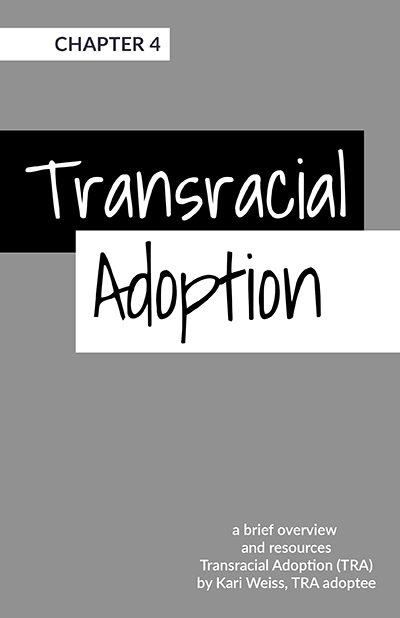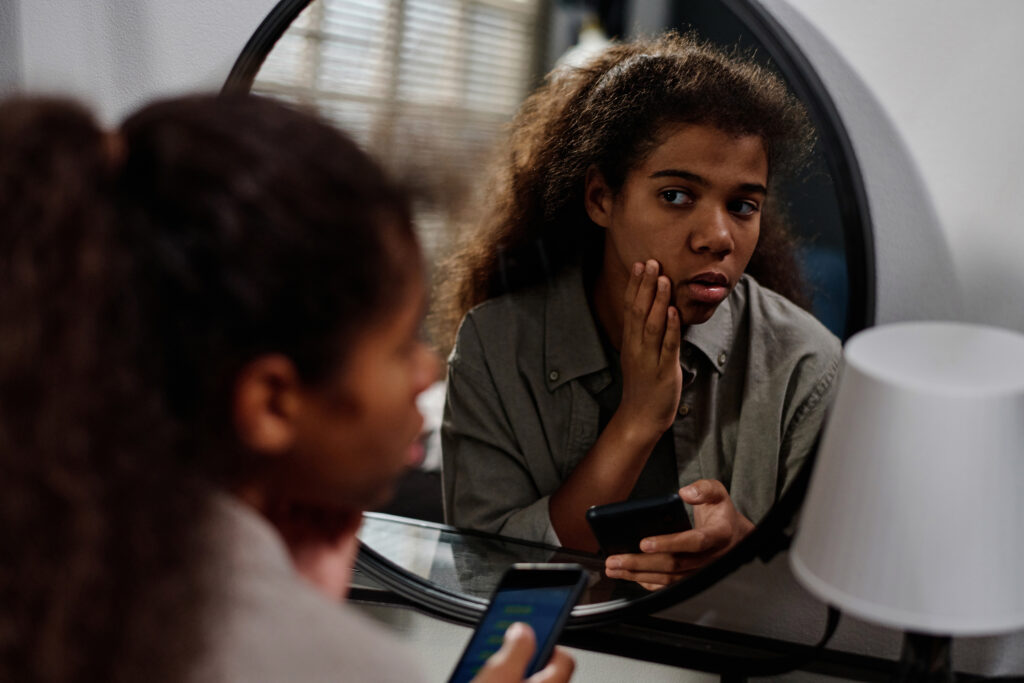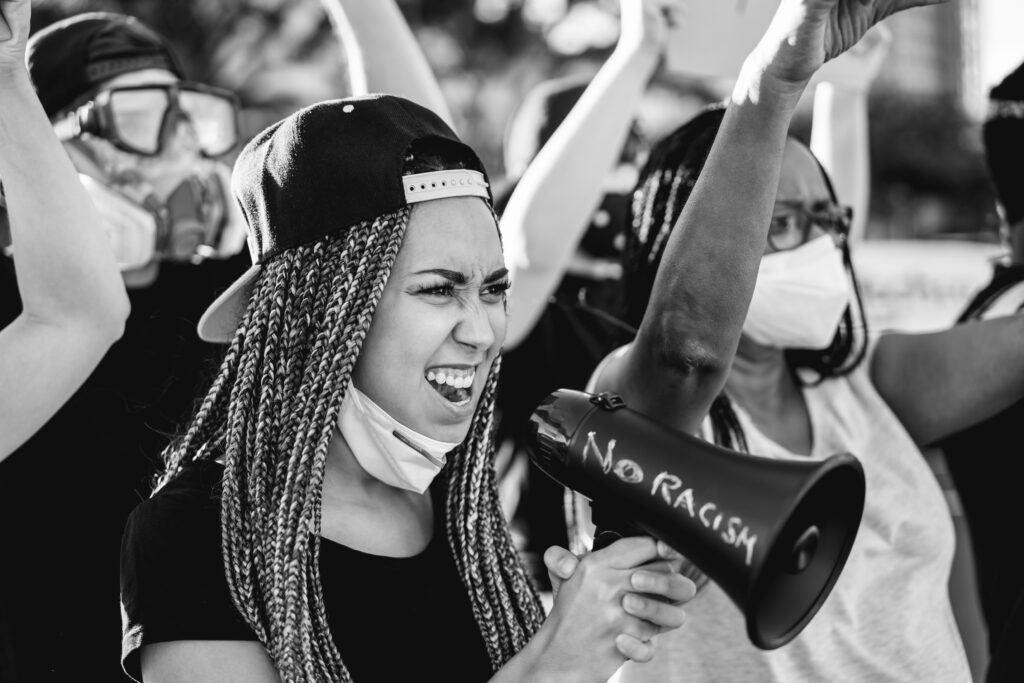

It is important for adoptive parents and hopefully adoptive parents to understand how losing genetic and cultural connections, as well as the trauma of relinquishment affects the mind and the body. For an Adoptee, they may not understand why they feel what they feel. They are the only one in the triad that has no say, but has every choice affect them. Understanding this information gives strength to work through their feelings. It also provides a place to show that they are not broken. I wrote this chapter to show a small piece of the impacts that adoptees face. – Kari
International transracial adoption is where the adoptive parents are not only different race or ethnicities form the adopted child, but different countries. For example, a Columbian adoptee adopted into a family from the United States. Transracial adoption adds more layers to an already complex adoption situation. Adding to the loss with relinquishment there is also loss with culture, sounds, food tastes, racial mirrors, and a sense of belonging.
So what now?
Adoptive parents and looking inside.
Do you own work. Adoptees have been made to be the one to mold to a new environment. And adoptive parents usually have an idea of what the “perfect” family will look like after just being able to have the child into their house. That usually isn’t the case. Some adoptees will be a perfect fit, never have issues, the baby will never cry. Do you know this is a sign of trauma?
Some children will lash out, be angry, and the epitome of a “horrible” child. Do you know this is also a sign of trauma? So how will YOU handle it. What skills do you have to keep yourself in check? What expectations have you put on this child already? Because children should never have expectations on them. They should be children. As for any parent, adoptive parents need to have counseling to work through their own insecurities, grief, triggers, and coping skills. Children (biological and adopted) will always pull out the areas you need the most work in. But it isn’t their job to fix that, it is the parent’s job.
The importance of stopping stereotypes.
Adoptees are not bad, angry, ungrateful, not experiencing trauma because they are happy, or who will end up just like their mother who is incarnated (when the adoptive parent gets upset). Yes these are all comments spoken to or about adoptees. Stereotyping any group only gets to horrible assumptions and misinformation. Stereotyping adoptees, usually when they are acting difficult, tells your adoptee that they are and won’t ever be good enough as they are. Using their culture against them tells them they are inherently bad for just being. Look and reflect on your own stereotypes and be better. Also, figure out how to educate those around you to be better.
Racism exists, and it exists in your neighborhood.
You may know when your child is experiencing racism. It may be in school, in the neighborhood, or with other children. Just because you don’t know, don’t assume that it isn’t happening. Some adoptees won’t share they are experiencing racism. It is your job to be the protector and the educator for your neighborhood.

Racism is not just using the n word.
Lets talk about microaggressions. Microaggressions are small, usually not indented forms of racism or sexism towards minority groups. They can be towards how someone speaks for example telling a POC they speak really great English. Why is this a microaggression, because it is assumed by the way the look they should not have good English because they are not white.
These microaggressions can also be due to physical forms; such as hair. Black hair is curly, textured, and beautiful. In society, in many places it has been deemed unprofessional or not up to school standards when work natural or in braids. Why do you think this is? This is a form of systemic racism that has been passed down from generations to appeal to a standard set by colonizers. If you have a Black adoptee, or a transracial adoptee, you may have these moments where you feel they should have “tame” hair. On the flip side, your adoptee will only see your racial mirrors if your world is predominately white.
So how do we fix this?
The first step it to look at yourself and ask yourself are you racist? Most people will say undoubtably no. Maybe offer a justification, “I have POC friends.” “I voted for Obama” or “I support the POC family who comes to my church.” But there should be a deeper dive. POC adoptees experience racism in “normal ways” where white people usually will discredit the interaction. On the surface, it may look like someone just giving an opinion or having a bad day. For example, transracial adoptees are constantly told my other children and adults that they do not look like their parents.
This brings me to color blind racism. There have been stories of POC adoptees who were told by their adoptive parents they were white. No, the world is not devout of color. No we don’t want you to not see color. Color is what makes us unique, special, and wonderful. Adoptive parents need to celebrate their child’s skin color, culture, and background. They need adoptive parents to be the safe place to experience that because most likely they will get the opposite from the outside world.
Lets not forget the hair and racial mirrors.
Take your adoptee to hair stylists that know their type of hair. Do all Black people know all curls, not always- but it is a good start. Meaning if you have an Indian adoptee with curls, they are different than Black curls. Learn because your adoptee should grow up loving the hair they have, and not fighting it because no one knows how to correctly moisturize the hair.

But it is deeper than that.
Racism is a systemic problem. A transracial adoptee will be raised with a white person mentality, leaving out the systemic awareness that a POC family may heed. For example, a Black adoptee boy may not be told how to “behave” when pulled over by a cop because this is not a problem for white person. Meerly saying, listen and follow orders isn’t enough when Black individuals are treated harsher in situations. Leaving out, keeping hands on the dash or calm tones isn’t part of the teachings of the family.
Many transracial adoptees come from families who have experienced loss, whether it is from substance abuse or incarceration.
Standing up against racism.
How will you create a better environment for your POC child? How will you make sure that they are safe in their elementary school? What about riding their bike? Driving their car in the city? Being taken care of in a healthcare system? A quick search shows statistically, Blacks and POC
receive less quality of care than whites do in healthcare. Are you ok saying, well I will be there, this isn’t going to happen to my child? What if they are away at college and get sick? What if they are giving birth and their pain isn’t recognized, and you can’t be there? What are you doing to change this?

References
Moore, K. L., Persaud, T. V. N., & Torchia, M. G. (2020). The developing human:
Clinically oriented embryology (Eleventh edition. ed.). Elsevier.
Psychology Today. (2024). Microaggressions.
https://www.psychologytoday.com/us/basics/microaggression